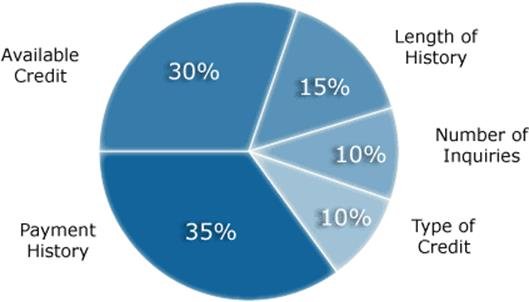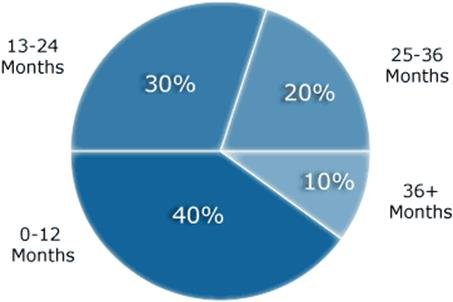How Is My Credit Score Calculated?
A credit score is a number that ranks a consumer's credit risk based on a statistical evaluation of information in the consumer's credit file, information that has been proven to predict loan performance. In layman's terms, a credit score is simply a number that represents the risk that you will default on a loan, using your prior payment history as a benchmark
Scoring Models and Financial Goals
Each mathematical algorithm used to calculate credit scores is unique, so we work with our clients to identify their personal goals and work to restore their individual credit to best fit their upcoming loan. For example, if your goal is to purchase a new home, then your credit restoration plan should focus on improving your FICO score, the score used by mortgage lenders. Read below to find out more about the different factors that can affect your credit score.
FICO
Though it is only one model, the FICO score is complex - too complex to describe in detail here. The overview presented here provides an introduction to the factors that contribute to the FICO score. To learn more about the FICO score and other scoring models, please fill out the form to the right, and we will contact you directly at your convenience
FICO Weights
The FICO score is based on five different weighted factors:
- Payment History: The record of your on-time and late payments
- Available Credit: Your credit limit minus the amount you owe for each account
- Length of History: The time elapsed since each account was opened
- Number of Inquiries: Records of inquiries logged when you apply for credit
- Type of Credit: Mortgages, installment loans, revolving accounts, etc.
Each of these factors has a different weight, summarized in the following chart:
FICO Score Factor Weights

Age of Information
In addition to factor weights, the FICO model applies different weights to information based on how old it is. The newer the information is, the more it affects the score.
The following chart summarizes the weights the FICO models applies to information based on its age:
Age-Based FICO Weights

Non-Factors
Efficient credit optimization requires an awareness of factors that don't impact scores to avoid wasted effort. The FICO model does not incorporate any of the following factors: * Age * Education * Income * Race * Marital status * Length of residence * Gender * Disability * Length of employment * National origin * Public assistance
Simple Ways to Improve Your FICO Score
With all the different kinds of information that credit scoring models incorporate, numerous tactics for improving scores are available. However, any action to improve a score must be taken judiciously. Be aware that some actions aimed at improving your score may actually make it worse. Contact your lender to determine which steps will help your credit the most.
Many individuals reap significant benefits by properly employing these simple FICO score improvement techniques:
- Make payments on time, especially to installment and revolving accounts, as these report to the bureaus monthly.
- Do not apply for any new credit cards or loans.
- Pay credit card balances down to 30% of your credit limit or less.
- Make sure your credit card company reports a limit.
- Keep 3-5 open and active accounts in good standing on your credit report.
- Review your credit report every year.








